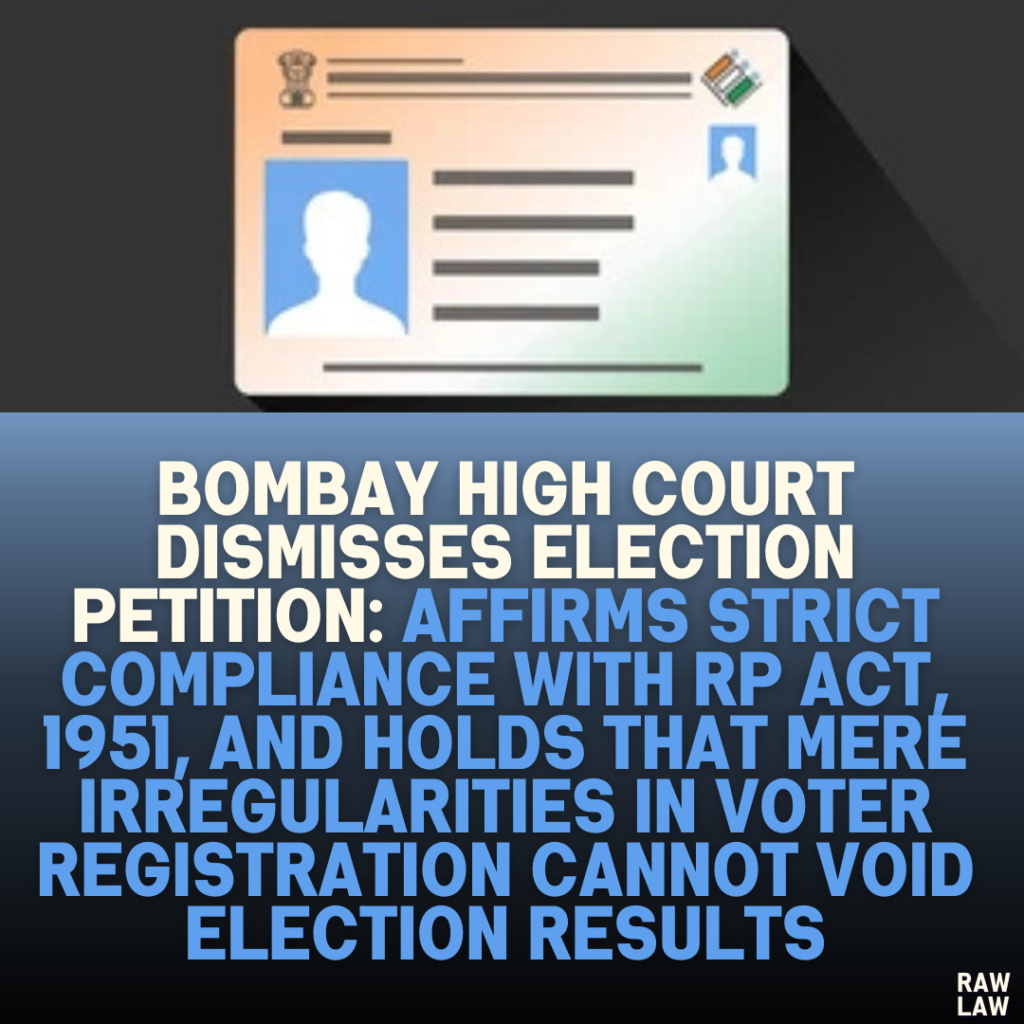Court’s Decision
The Bombay High Court dismissed an election petition challenging the validity of an election in the Pune Division Graduates’ constituency. The court held that the petitioner failed to substantiate allegations with material facts demonstrating how the alleged irregularities materially affected the election result, as required under the Representation of the People Act, 1951. The petition was also dismissed for procedural lapses and failure to comply with statutory requirements under Sections 81, 82, and 83 of the RP Act.
Facts
- Election Details:
- The election was held on December 1, 2020, and the results were declared on December 4, 2020.
- The returned candidate secured 1,22,145 votes, while the petitioner received 73,321 votes.
- Petitioner’s Allegations:
- Irregularities in voter registration, particularly online registration, were permitted beyond the cutoff date of December 30, 2019.
- Inclusion of names of non-graduates and duplicate entries in the electoral rolls.
- Suppression of income details by the returned candidate in the affidavit submitted during nomination.
- Reliefs Sought:
- The petitioner requested that the election of the returned candidate be declared void under Sections 100(1)(d)(iii) and 100(1)(d)(iv) of the RP Act.
- The petitioner also sought to be declared the duly elected candidate.
Issues
- Does the election petition provide material facts demonstrating that alleged irregularities materially affected the election results?
- Can irregularities in the preparation of the electoral roll form grounds for voiding an election under the RP Act?
- Was the petition filed within the statutory time limit and in compliance with Section 81 of the RP Act?
Petitioner’s Arguments
- Voter Registration Irregularities:
- Alleged that online voter registrations were accepted beyond the prescribed deadline without proper verification.
- Contended that names of non-eligible voters, including non-graduates and duplicate entries, were included in the electoral roll.
- Improper Voting Practices:
- Claimed that unusually high voting rates in certain polling stations suggested malpractice, which materially affected the results.
- Suppression of Facts:
- Alleged that the returned candidate submitted false and misleading information in the affidavit regarding income and assets.
- Material Effect on Results:
- Argued that excluding invalid votes and correcting the voter roll would have changed the outcome in the petitioner’s favor.
Respondent’s Arguments
- Procedural Deficiencies:
- Contended that the petition failed to meet the requirements of Section 83 of the RP Act, which mandates a concise statement of material facts and full particulars of alleged corrupt practices.
- Asserted that the petition was time-barred under Section 81, which requires filing within 45 days of the election.
- No Material Impact:
- Emphasized that the petitioner failed to demonstrate how the alleged irregularities materially affected the election outcome.
- Highlighted that irregularities in voter rolls cannot void an election unless they directly impact the result.
- Non-Compliance with RP Act:
- Argued that the petitioner’s allegations of procedural violations did not constitute grounds for voiding the election under Sections 100(1)(d)(iii) or 100(1)(d)(iv).
- Affidavit Allegations:
- Claimed that disputes regarding the affidavit should be pursued under Section 125A of the RP Act through separate proceedings.
Analysis of the Law
- Material Facts Requirement:
- Section 83(1)(a) of the RP Act mandates that an election petition must contain a concise statement of material facts and full particulars of alleged corrupt practices. The court found that the petitioner’s allegations were vague and lacked sufficient detail.
- Grounds for Voiding an Election:
- Under Section 100(1)(d)(iii) of the RP Act, the petitioner must demonstrate that the improper reception, refusal, or rejection of votes materially affected the election results.
- Under Section 100(1)(d)(iv), the petitioner must show that non-compliance with statutory provisions or constitutional mandates materially impacted the election outcome. The court held that the petitioner failed to meet these thresholds.
- Precedent:
- Jyoti Basu v. Debi Ghosal: Election disputes are statutory proceedings, requiring strict compliance with the RP Act.
- Mangani Lal Mandal v. Bishnu Deo Bhandari: A violation of statutory provisions does not void an election unless it materially affects the outcome.
- Procedural Compliance:
- The court reiterated that compliance with Sections 81 (timely filing), 82 (necessary parties), and 83 (material facts) is mandatory for maintaining an election petition.
Court’s Reasoning
- Failure to Plead Material Facts:
- The petitioner failed to provide specific details about how irregularities in voter registration and alleged malpractice materially impacted the results.
- No Grounds for Void Election:
- Irregularities in the preparation of electoral rolls, such as inclusion of non-graduates or duplicate entries, do not constitute grounds under the RP Act for voiding an election.
- Time-Barred Petition:
- The court noted that the petition was filed beyond the 45-day limitation period under Section 81.
- Affidavit Allegations:
- Disputes regarding the accuracy of affidavits require separate proceedings under Section 125A of the RP Act and do not directly affect the validity of the election.
Conclusion
The court dismissed the election petition for lack of material facts, failure to demonstrate a material impact on the election results, and procedural non-compliance. It also directed the petitioner to amend the application to exclude statutory authorities wrongly impleaded as respondents.
Implications
- Reinforces strict adherence to the procedural and substantive requirements of the RP Act in election disputes.
- Clarifies that allegations of irregularities must be substantiated with evidence demonstrating material impact on results.
- Affirms that procedural lapses, such as improper voter registration, do not automatically void elections.




Pingback: Jammu & Kashmir High Court Quashes Preventive Detention Order Under PSA: "Vague Allegations and Procedural Violations Breach Constitutional Safeguards Under Articles 21 and 22" - Raw Law